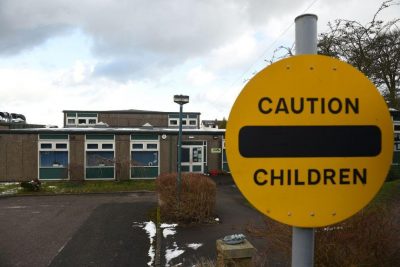Scotland Announces School Closures Due to Covid-19

And so we have it. The much-awaited announcement regarding school closures in Scotland has taken place, and once again Nicola Sturgeon has beaten her Westminster counterpart by addressing the nation in relation to Covid-19. Schools are to be shut from Friday onwards, with no guarantee they will re-open prior to the summer break at the beginning of July. Exams will be postponed as young people’s lives are put on hold.
There was huge outcry last week when Sturgeon briefed the nation ahead of Boris Johnson on the next steps to be taken after Thursday’s Cobra meeting. Journalists and commentators were aghast – how could she have abandoned protocol by ‘announcing Johnson’s plan for him’ – it was said. The reality was however that Sturgeon was addressing the Scottish nation, and outlining Scotland’s individual approach to the coronavirus pandemic. She announced a ban on mass gatherings of more than 500 people – something which Johnson did not – much to the concern of some experts. The government later succumbed to pressure and buckled on this issue over the weekend, stating that mass gatherings would be banned.
There is political significance in Sturgeon not wanting to hang around waiting for Boris Johnson. By being pro-active and making announcements first, it shows that she takes the public health crisis seriously, and wants to inform the public as soon as possible. It sends a signal that the Scottish government is managing the crisis. But more importantly, by Sturgeon announcing key measures ahead of Johnston, such as closing schools, she implies that Scotland is one step ahead of Westminster. It’s a clever strategy; if you want to become an independent country then the first stage is to start acting like one. Sturgeon is sending a subtle message to the nation that her government is ahead of the game.
For Covid-19 has the potential to unite Britain in a way that we haven’t seen since the Second World War. Independence for Scotland now will surely be put on the back burner. With the death toll now standing at over 100, and predictions that we could see at least 20,000 deaths from the outbreak in the UK alone, the gravity of the situation is really starting to be felt here. Life is already changing dramatically. Streets are deserted in Scotland’s capital, Edinburgh, with only a handful of people travelling on public transport. Many people are now working for home and keeping children off school. The busiest places at the moment are supermarkets, as the panic buying continues and shelves lie empty. Tesco has already announced it will have to close 24-hour stores for a few hours each day to try to replenish stock and keep up with demand.
People will have to adapt to a totally new way of life. It’s like someone has pressed the ‘pause’ button on the remote. Social distancing means that normal routines and ways of life for the young and old alike will be completely interrupted. Children will have to be amused and entertained at home, while the many elderly people who live on their own could feel increasingly isolated. Thankfully, I’ve heard that local businesses are taking the initiative to offer home deliveries of groceries to the elderly or infirm forced to stay indoors. Neighbours are also playing an important role, offering assistance to those less able. On a positive note, we could see our communities pulling together over this crisis and people helping each other in a way not seen since the war.
And when it’s all over, when we can finally breathe again, we’re sure to start asking if anything could have been done differently. Boris Johnson has assured us that the ‘timing is crucial’ as he has tentatively rolled out his plan. However, criticism has already begun of his approach, with some medical professionals saying his strategy of aiming to generate ‘herd immunity’ is flawed, and will swamp the NHS. Richard Horton, Editor of the Lancet journal, has written a scathing review of it, saying Johnson has taken far too long to react to the Covid-19 outbreak, given the warnings that came thick and fast from China and Italy earlier in the year. Ominously he believes it is now ‘too little, too late.’
Indeed, with nothing short of a catastrophe unfolding in Italy, the prospects for the UK don’t look good. NHS staff are already complaining that there is a lack of testing for coronavirus amongst health workers, leading to unnecessary staff shortages as some self-isolate at home if they display symptoms. Current efforts to test around 4000 people a day are dwarfed by those in, for example, South Korea, where they manage around 10,000 tests daily. And although the Prime Minister has said he is aiming for 25,000 tests carried out per day, it’s still not clear how soon Britain would be able to achieve this.
We are indeed in unprecedented territory, with each day bringing more questions and fewer answers as to how we can fight the coronavirus…
*
Note to readers: please click the share buttons above or below. Forward this article to your email lists. Crosspost on your blog site, internet forums. etc.
This article was originally published on InfoBrics.
Johanna Ross is a journalist based in Edinburgh, Scotland.

